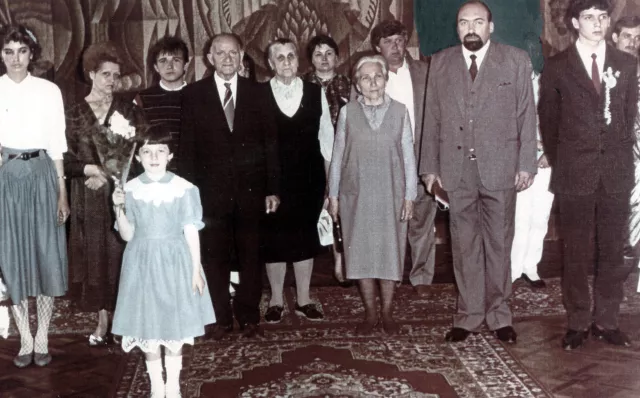Wedding of my older granddaughter Natasha. My son Victor (with a beard), I am standing beside him and the rest are Natasha's relatives. Photo made in Lvov in 1990.
In 1949 my mother, my son Victor and I left Kalay for good. We went to Lvov where my sister lived.
In Lvov we stayed some time with our friend Lyova Gershman that also came from Kalay after the war. Later we got an apartment. We lived together: my sister and Ruvim in one room and my mother, Victor and I - in another. Except for few moths when I went to work in Brody, Lvov region and Khmelnitskiy I lived my life in this apartment. We were a close family. My sister and her husband supported me treating him to a meal, giving him toys and clothes, entertaining and spoiling him. My life wasn't easy. I went on my first vacation when my son turned 18. I never had any recreation before: I received my 'vacation pay' (I always needed money) and stayed at work. I got along well with my colleagues. I had Jewish, Russian and Ukrainian friends. We celebrated birthdays and Soviet holidays together. We didn't observe any traditions or celebrate Jewish holidays. We stayed at home in the evenings having discussions and drinking tea. Sometimes our friends and acquaintances visited us. I spent time with my son and was busy doing housework: cleaning, cooking and washing.
Director of the factory where I worked of this shop was Semyon Averbukh. He was kind with me. He understood how hard it was for me to raise a son. Semyon trained me and I was soon promoted to supervisor. We made rubber boots and went to sell them in other towns. We had a multinational collective at work. In early 1950 state anti-Semitism was at its height. Radio and newspapers broadcast news about Jewish cosmopolites and doctor poisoners. One could hear abusive ‘zhydovka’ everywhere in the streets, but we had good relationships in our collective. We went onto parades on 1 May and 7 November and celebrated all Soviet holidays in our club, had parties drinking and singing Soviet songs.
I took absolutely no interest in any politics. I was too busy with my personal issues. I had Russian and Ukrainian friends and never cared about nationality. When my son grew old I began to spend more time with friends gong to theaters and cinema and reading Soviet magazines. In late 1970s my sister and I bought a TV and spent evenings watching it. I went on vacation to the Crimea several times.
My son Victor had Jewish, Ukrainian and Russian friends at school. He wasn't great success with his studies, but he was a cheerful and sociable boy. He didn't face any anti-Semitism. After finishing school he finished a barber school and became a skilled barber. He was promoted to director of a barbershop. Victor married a Russian girl Valia. They had two daughters: Sonia and Natasha. His first marriage failed, though. My son always identified himself as a Jew, but he came to the Jewish way of life after he got Jewish friends at 16 that observed Jewish traditions and were religious. He could not celebrate holidays at home since Valia teased him about it and happened to not turned out to be - no be anti-Semitic. The majority of his colleagues were Jews and they didn't have any objections when Victor became director; they liked and respected him. Perhaps, he wouldn't have made such good career if he had worked ina Ukrainian collective. In 1992 Victor divorced Valia and married Alla, a Jewish woman. Victor and Alla decided to move to Israel. Victor was always interested in this country and listened to foreign radio stations that were jammed during the Soviet power to conceal the true situation in Israel and the rest of free world from people in the Soviet Union. Victor and Alla submitted their documents for obtaining permission to move to Israel. I was planning to go with them when Victor fell severely ill. He got arthritis and he was confined to bed. In 1999 my son died. I buried him near my mother's grave at the town cemetery.
In 1979 I began to receive pension, but I continued working. I retired in 1989 when Perestroika began and our factory became unprofitable. Perestroika didn't bring anything good into my life. I get miserable pension enough to buy bread.
Hava Goldshtein with her son Victor Goldshtein and other relatives
The Centropa Collection at USHMM
The Centropa archive has been acquired by the United States Holocaust Memorial Museum in Washington, DC.
USHMM will soon offer a Special Collections page for Centropa.
Academics please note: USHMM can provide you with original language word-for-word transcripts and high resolution photographs. All publications should be credited: "From the Centropa Collection at the United States Memorial Museum in Washington, DC". Please contact collection [at] centropa.org.












